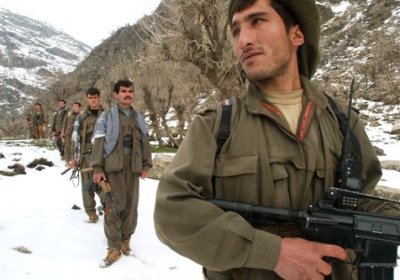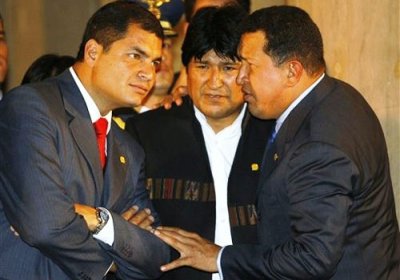On June 1, the Kurdish Workers Party (PKK) announced an end to its 13-month unilateral ceasefire. Since 1984, the PKK has waged an armed struggle against the Turkish state for Kurdish self-determination.
A day earlier, imprisoned PKK leader Abdullah Ocalan announced that he was withdrawing from negotiations. He cited a disconnect between the Turkish government’s promised reforms and continued violent repression of Turkey’s Kurdish population.
843
The Bolivarian Alliance for the Peoples of Our America (ALBA) released a statement on June 28 reaffirming its commitment to the Honduran people’s struggle for a return to democracy one year after the coup that overthrew president Manuel Zelaya.
ALBA is an anti-imperialist alliance founded in 2004 by Cuba and Venezuela. Its members include Bolivia, Ecuador, Nicaragua, Dominica, Saint Vincent and the Grenadines, and Antigua and Barbuda.
Under Zelaya, Honduras joined ALBA, which suspended Honduras’s membership after the coup. The regime has since withdrawn from ALBA.
At dawn one year ago, on June 28, soldiers invaded the home of Honduran president Manuel Zelaya and flew him to Costa Rica.
It was a frightening throwback to the days when military men, backed by a local oligarchy and often the United States, could overturn the results of democratic elections.
It would also turn out to be a pivotal moment for relations between the US and Latin America. A new generation of left-of-centre governments in Argentina, Bolivia, Brazil, Chile, Ecuador, Paraguay, Uruguay, and Venezuela were all hoping for a new relationship with Washington.
The Punjab government has been given three months to decide the fate of 68,000 hectares of agricultural land. The land is owned by the government and has been cultivated by tenants for more than 100 years.
The tenants have demanded land ownership rights. Despite government promises, the land has not been allotted to them.
The three months’ notice was given at the end of a huge peasants rally on June 29 at Okara. The rally was organised by the Punjab Tenants Association (AMP) on the eve of the anniversary of 10 years of the tenants’ struggle for land ownership rights.
Just after becoming prime minister, Julia Gillard told media on June 24 she could understand “the anxiety and indeed fears that Australians have when they see [refugee] boats”. She did not cite evidence for this claim. She said that, as PM, she would explain to the Australian people “what we are doing to manage our borders and what we are doing to manage asylum seeker flows”.
The Queensland Crime and Misconduct Commission (CMC) recently released a report highly critical of the police investigation into the case of Palm Island Aboriginal man Mulrunji Doomadgee, who died in police custody in November 2004. The CMC gave police commissioner Bob Atkinson 14 days to take disciplinary action against six officers involved.
Atkinson was due to make his decision by July 2, but an injunction filed on behalf of the officers extended the deadline until July 6
A Short Border Handbook
By Gazmend Kapllani
Portobello Books 2009
159 pages
Review by Alex Miller
This book, which the author describes as “part autobiography, part fiction”, is hard to assess. Each chapter is divided into two parts. The first part tells the story of a man (presumably Kapllani himself) who crosses into Greece from Albania when the border between those two countries opened in 1991. The second part consists of “philosophical” ruminations on issues raised by the story of the first part.
The number of “High Net Worth Individuals” (HNWIs) in Australia — those with more than US$1 million in investable assets, excluding the family home — soared to 173,600 last year. This, according to the latest World Wealth Report, was an increase of 34.4% on the year before.
The June 30 Sunshine Coast Daily said: “What's more impressive is Australia's ranking in the global population of HNWIs. Out of 71 countries, Australia has the 10th biggest population of HNWIs in the world, in front of Brazil and just behind that millionaire's paradise of Switzerland.”
South Australian independent Bob Such announced on June 28 he would introduce a private member's bill into the state parliament that would, in effect, ban the wearing of the burqa or the niqab in banks and government buildings.
Such claimed his bill would not be discriminatory and would target any face covering where security might be a concern. However, all his public statements have specifically raised the burqa and its possible use in criminal activity.
Multicultural affairs minister Grace Portolesi said SA police have said they have no such concerns about the burqa.
National Tertiary Education Union (NTEU) members at the University of New South Wales (UNSW) began industrial action on June 30 to pressure management to reach agreement with the union on a range of claims. They want reinstatement of job security protections for contract research staff; improved conditions for casual and fixed-term staff; Indigenous employment targets and an increase in paid parental leave from 26 to 36 weeks.
Eighty people gathered at the State School Teachers Union offices in Perth for the Socialist Ideas Conference over the weekend of June 26-27. Speakers included Jeyakumar Devaraj, Socialist Party of Malaysia MP, and Richard Downs, spokesperson for the Alyawarr People's Walk-off in the Northern Territory.
The Canterbury Bankstown Peace Group, with the Justice for Aafia Coalition, is calling for the release of Dr Aafia Siddiqui. The Pakistani doctor was found guilty on February 3 of shooting US soldiers in July 2008, while in Afghan police custody.
Siddiqui was accused of being an Al Qaeda agent and has allegedly spent time in secret prisons in Pakistan and in the US prison in Guantanamo Bay. Despite this, she has not been charged with any terrorist offences but only with firearms offences allegedly committed during her capture.
- Previous page
- Page 3
- Next page









